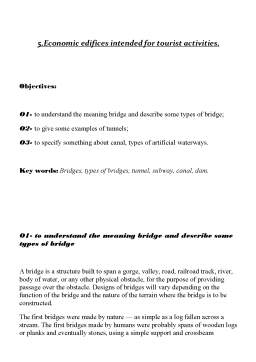Extras din curs
Theme 1. The subject of study Tourism Resources Management
1. Introduction to the tourism resources management.
Objectives:
O1- to define tourism and the meaning of tourist;
O2- to present several scientists opinions concerning tourism definition;
O3- to find some demonstrative methods.
Key words: tourism, tourist, traveler.
01- to define tourism and the meaning of tourist
Tourism- the business activity connected with providing accommodation, services and entertainment for people who are visiting a place for pleasure.
Tourist- 1.a person who is traveling or visiting a place for pleasure; 2. (BrE) a member of a sports team that is playing a series of official games in a foreign country.
Tourism is travel for predominantly recreational or leisure purposes or the provision of services to support this leisure travel. It can be notices that the high proportion of tourist resources (especially of human origin) is ignored. It lead to the wording of the incomplete definition. The World Tourism Organization defines tourists as people who ”travel to and stay in places outside their usual environment for not more than one consecutive year for leisure, business and other purposes not related to the exercise of an activity remunerated from within the place visited”. The term tourism and tourist are sometimes used operatively, to imply a shallow interest in the cultures or locations visited by tourists. Tourism represent a business activity connected with providing accommodation services and entertainment for people who are visiting a place for pleasure. When we thing of tourism, we think primarily of people who are visiting a particular place for sightseeing, visiting friends and relatives, taking a vacation, and having a good time. They may spend there leisure time engaging in various sports sunbathing, talking, singing , taking rides, touring, reading, or simply enjoying the environment also people who participate in a convention, a business conference , or some other kind of business or professional activity. Tourism is a composite of activities, services, and industries that delivers a travel experience: transportation, accommodations, eating and drinking establishments, shops, entertainment, activity facilities, and other hospitality services available for individuals or groups that are traveling away from home. It encompasses all providers of visitor and visitor-related services. Tourism is the entire world industry of travel, hotels, transportation, and all other components, including promotion that serves the needs and wants of travelers. Finally, tourism is the sum total of tourism expenditures within the borders of a nation or political subdivision or a transportation-centered economic area of contiguous states or nations. This economic concept also considers the income multiplier of these tourist expenditures. Any tourist activity is based on flow of people geared to tourist researches during which the consumption of tourist product and the infrastructure are put together. Tourism as a human activity is inconceivable (concept) without the presence of human factor, actually the human being. At the dawn of the 3rd millennium the tourism will sooner become following the general tendency of human social evolution, the most effective economic field (it is sometimes called the smokeless industry). That’s why the study of this discipline must receive all the information concerning the stage of tourism phenomenon. The tourist phenomena includes all the motivations activities of a leisure and health nature extended in a given place and a given moment.
02- to present several scientists opinions concerning tourism definition
Human beings are especially curious concerting the word in which they live. They need and want to know what other places look like- the people, their culture, the animals and plant life, and landforms may be elsewhere. Although travel can be undertaken for many reasons, the most common are pleasure, business, and study. The subject of travel is very exciting and fascinating. Humanlike beings have been moving from place to place for about 1million years. Tourism is a rapidly growing international business and it is vital for many countries, due to the large intake of money for businesses with their goods and services and the opportunity for employment in the service industries associated with tourism. The terms tourism and travel are sometimes used interchangeably. In this context travel has a similar definition to tourism, but implies a more purposeful journey. Poser, from his view, tourism represents a local or regional concentration foreigners on a temporary basis which generates mutual relationships with the native population. Scientist Frailer in its manual of Swedes people economy in 1905 shows that tourism is a phenomenon of our days based on the increasing need for recovering and change in home environment on birth and development of a feeling for nature. Hunziker and Krapf, in 1941, defined, tourism as ”the sum of the phenomena and relationships arising from the travel and stay of non-residents, insofar as they do not lead to permanent residence and are not connected with any earning activity”. In 1976 Tourism Society of England defined it as ”Tourism is the temporary, short-term movement of people to destination outside the places where they normally live and work their activities during the stay at each destination. It includes movement for all purposes”. In 1981 International association of Scientific Experts in Tourism defining tourism in terms of particular activities selected by choice and undertaken outside the home environment. The United Nations classified three forms of tourism in 1994 in its Recommendations on Tourism Statistics: Domestic tourism, which involves residents of given country traveling only within this country; Inbound tourism, involving non-residents traveling in the given country; and Outbound tourism, involving residents traveling in another country. Recently, the tourism industry has shifted from the promotion of inbound tourism to the promotion of outbound tourism because many countries are experiencing tough competition for inbound tourists.
Preview document
Conținut arhivă zip
- Gestiunea Resurselor Turistice.doc





































































































































































